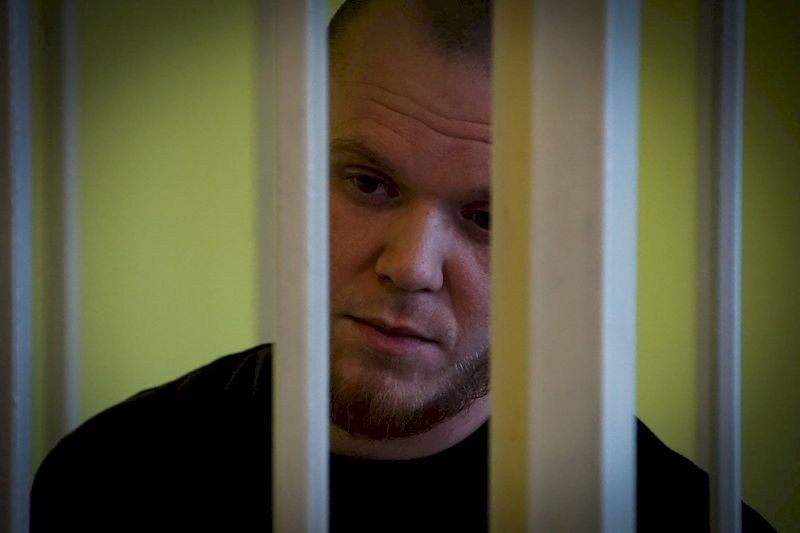Ukrainian political prisoner vanishes after being abducted by FSB instead of released from Russian prison

Hennadiy Lymeshko had already lost eight years in Russian captivity on politically motivated charges when his sentence ended on 21 February 2025. Instead of being freed, he was detained as he left the prison, on an absurd pretext, and placed in a temporary holding unit for foreign nationals. From there, he disappeared, with his family having had no contact with him since 13 March. There is no information about his whereabouts, however others who were in the holding unit with him have told Hennadiy’s wife, Iryna, that the was taken away by the Russian FSB. He has, therefore, been held incommunicado for almost five months, with the likelihood, unfortunately, high that he is being subjected to torture, in order to extract a ‘confession’ to new, fabricated charges.
There were fears back in September 2023 that new charges might be brought against Lymeshko, charges at least as surreal as those used for his initial 8-year sentence. He learned on 29 August 2023 that he was to be transferred to “harsh conditions of imprisonment’ [SUS] for the duration of his sentence. The prison administration had claimed that Lymeshko was “recruiting Russian citizens to fight on Ukraine’s side”. At the time, Iryna Lymeshko dismissed the accusation as sheer nonsense, pointing out that her husband was very cautious in what he said, and to whom. Lymeshko had had several visitations from the FSB since Russia launched its full-scale invasion of Ukraine, she added, with the FSB questioning Lymeshko about supposed links with Ukraine’s Security Service [SBU].
It is unclear as yet whether it is this type of charges that the FSB may now be fabricating against Lymeshko or others. Russia has already brought new charges against two Ukrainian political prisoners – Dmytro Shtyblikov and Oleh Prykhodko - while they were serving first sentences. The charges against 66-yearr-old Prykhodko were based solely on allegations made by cellmates. It is extremely easy for the prison administration or the FSB to manufacture such charges, either by using prisoners who collaborate with them for material benefit, or by threatening a prisoner with further charges if he does not provide false testimony against the Ukrainian political prisoner.
Whatever the charges, it is likely that Lymeshko has been targeted because he earlier defended Ukraine in Donbas, initially as part of a volunteer battalion linked with Right Sector, one of the Ukrainian nationalist movements that Russia has particularly demonized, and then as a contract soldier. It was while he was serving in Donbas in 2016 that he met his wife, a medical student from Lviv who was working as a paramedic during the university holidays. He left military service after the birth of their daughter.
Iryna has since explained that it was because he needed work that her husband ignored her warranted fears and took a job that he was offered in occupied Crimea.
Hennadiy Lymeshko (b. 29 December 1992) was seized on 12 August 2017 in Sudak, taken to a basement where he was subjected to beatings, electric shocks and other forms of torture, and threatened with reprisals against his family. He was later taken from the basement to the place where the FSB staged and videoed his supposed arrest. They reported his ‘arrest’ on 15 August 2017, claiming that he had arrived in Crimea on 12 August, and that, through his arrest, they had “prevented several acts of sabotage against infrastructure and vital services in Crimea” He was supposed to be “an agent of the SBU in the Kherson oblast, sent to Crimea to carry out acts of sabotage. The video performance produced appeared to show Lymeshko being seized by a group of people who used force against him until he asserted that “they told me to cut an electricity post”. He had allegedly planned to cut this concrete post with a handsaw which was seen lying on the ground near him.
A supposed ‘interrogation’ was shown in which Lymeshko, showing signs of having been beaten, ‘confessed’ to carrying out explosions on the electricity lines between Sudak and Novy Svyet in Crimea for somebody called ‘Andriy’ from the SBU. They also claimed that he was supposed to set fire to a forest in the Sudak – Rybachye – Alushta area and one other act of arson, and to cause a rock avalanche that would block the Sudak – Novyy Svet highway.
The countless discrepancies and sheer absurdities in this story were ignored by ‘judge’ Yevgeny Rykov from the occupation ‘Sudak city court’, as was the informal agreement that Lymeshko had reached, that he could expect a lighter sentence if he did not deny the charges. Although Lymeshko had, it seems, agreed to admit to the charges with the informal agreement being that he could expect a lighter sentence, he was deceived. Rykov claimed that there was a political motive of “hostility to the Russian Federation in connection with the reunification (sic) of Crimea” and that this constituted an aggravating factor. Lymeshko was sentenced to eight years in a medium-security prison colony, with this upheld on 24 June 2018 by the occupation ‘Crimean high court’.





